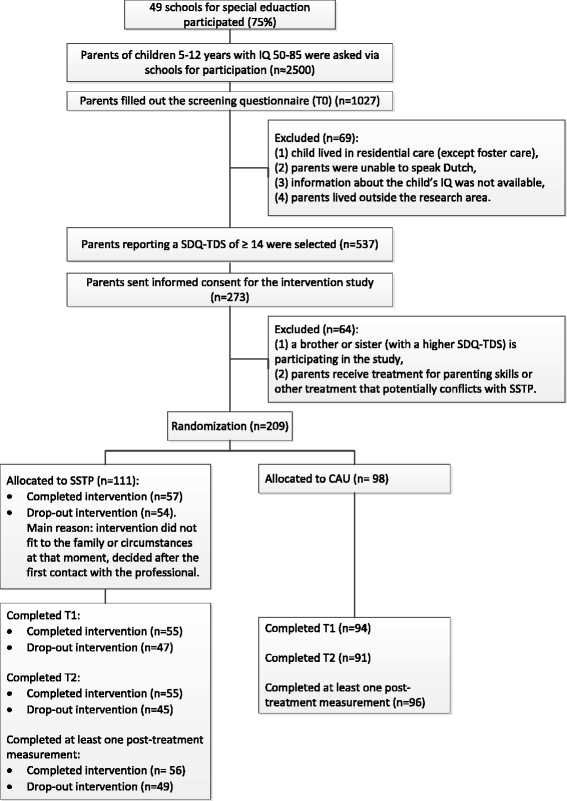The effectiveness of Stepping Stones Triple P parenting support in parents of children with borderline to mild intellectual disability and psychosocial problems: a randomized controlled trial
- PMID: 25348259
- PMCID: PMC4224755
- DOI: 10.1186/s12916-014-0191-5
The effectiveness of Stepping Stones Triple P parenting support in parents of children with borderline to mild intellectual disability and psychosocial problems: a randomized controlled trial
Abstract
Background: Children with borderline to mild intellectual disability (BMID) have been shown to be at increased risk for psychosocial problems. The presence of these psychosocial problems leads to parenting stress. Stepping Stones Triple P (SSTP) is a parenting support program to support parents with children with BMID and psychosocial problems. The aim of this study was to evaluate the effectiveness of SSTP compared to Care as Usual (CAU) in reducing psychosocial problems in children with BMID.
Method: We conducted a randomized controlled trial in the Northern provinces of the Netherlands. Parents of children aged 5 to 12 with borderline (IQ 70 to 85) or mild (IQ 70 to 50) ID and psychosocial problems were invited. Psychosocial problems were identified using the Strengths and Difficulties Questionnaire (SDQ) parent report (≥14). Measurements were assessed before the intervention (T0), immediately after the intervention (T1) and after a follow-up of six months (T2). SSTP takes 8 to 10 individual sessions of 40-90 minutes, provided over 10 to 12 weeks. CAU concerned any service, except SSTP. Primary outcomes were the child's psychosocial problems (SDQ parent and teacher forms and the Eyberg Child Behavior Inventory, ECBI). Secondary outcomes were parenting stress (Parenting Stress Index, PSI) and parenting skills (Alabama Parenting Questionnaire, APQ).
Results: In total 209 parents of children aged 5 to 12 with BMID were allocated blindly to either SSTP (n =111) or CAU (n =98). In the intention to treat analyses, SSTP achieved no significantly better effect than CAU for the SDQ parent report, the ECBI and the APQ on the short- and long- term. In the short term, SSTP was significantly more effective than CAU for the SDQ teacher report (B = -2.25, 95% CI -3.79 to -0.71) and the PSI (B = -7.06, 95% CI -12.11 to -2.01). For both SDQ teacher report and PSI, there was no statistically significant effect in the long term. Dropout from SSTP was considerable (49%), with the effects being solely found in the adherent SSTP subgroup.
Conclusions: SSTP had some short-term advantages over CAU, but not in the longer term.
Trial registration: Dutch Trial Register NTR2624. Registered 26 November 2010.
Figures
Comment in
-
Stepping Stones Triple P: the importance of putting the findings into context--a response to Tellegen and Sofronoff.BMC Med. 2015 Feb 19;13:36. doi: 10.1186/s12916-015-0289-4. BMC Med. 2015. PMID: 25877781 Free PMC article.
Similar articles
-
Stepping Stones Triple P: the importance of putting the findings into context--a response to Tellegen and Sofronoff.BMC Med. 2015 Feb 19;13:36. doi: 10.1186/s12916-015-0289-4. BMC Med. 2015. PMID: 25877781 Free PMC article.
-
The effectiveness of Stepping Stones Triple P: the design of a randomised controlled trial on a parenting programme regarding children with mild intellectual disability and psychosocial problems versus care as usual.BMC Public Health. 2011 Aug 30;11:676. doi: 10.1186/1471-2458-11-676. BMC Public Health. 2011. PMID: 21878093 Free PMC article. Clinical Trial.
-
The effectiveness of VIPP-V parenting training for parents of young children with a visual or visual-and-intellectual disability: study protocol of a multicenter randomized controlled trial.Trials. 2015 Sep 9;16:401. doi: 10.1186/s13063-015-0916-6. Trials. 2015. PMID: 26353825 Free PMC article. Clinical Trial.
-
Systematic Review and Meta-analysis of Stepping Stones Triple P for Parents of Children with Disabilities.Fam Process. 2019 Mar;58(1):232-246. doi: 10.1111/famp.12352. Epub 2018 Mar 9. Fam Process. 2019. PMID: 29520764
-
The first 1001 days: A scoping review of parenting interventions strengthening good enough parenting in parents with intellectual disabilities.J Intellect Disabil. 2025 Jun;29(2):447-468. doi: 10.1177/17446295231219301. Epub 2023 Dec 5. J Intellect Disabil. 2025. PMID: 38050742 Free PMC article.
Cited by
-
Toward tailored care for families with multiple problems: A quasi-experimental study on effective elements of care.Fam Process. 2022 Jun;61(2):571-590. doi: 10.1111/famp.12745. Epub 2021 Dec 21. Fam Process. 2022. PMID: 34931305 Free PMC article.
-
Psychological interventions for parents of children with intellectual disabilities to enhance child behavioral outcomes or parental well-being: A systematic review, content analysis and effects.J Intellect Disabil. 2025 Jun;29(2):500-535. doi: 10.1177/17446295241302857. Epub 2024 Nov 27. J Intellect Disabil. 2025. PMID: 39603255 Free PMC article.
-
Stepping Stones Triple P: the importance of putting the findings into context.BMC Med. 2015 Feb 4;13:25. doi: 10.1186/s12916-014-0260-9. BMC Med. 2015. PMID: 25649871 Free PMC article.
-
The Effectiveness of Parent Management Training-Oregon Model in Clinically Referred Children with Externalizing Behavior Problems in The Netherlands.Child Psychiatry Hum Dev. 2017 Feb;48(1):136-150. doi: 10.1007/s10578-016-0660-5. Child Psychiatry Hum Dev. 2017. PMID: 27306883 Free PMC article. Clinical Trial.
-
Stepping Stones Triple P: the importance of putting the findings into context--a response to Tellegen and Sofronoff.BMC Med. 2015 Feb 19;13:36. doi: 10.1186/s12916-015-0289-4. BMC Med. 2015. PMID: 25877781 Free PMC article.
References
-
- Kaptein S, Jansen DE, Vogels AG, Reijneveld SA. Mental health problems in children with intellectual disability: use of the Strengths and Difficulties Questionnaire. J Intellect Disabil Res. 2008;52:125–131. - PubMed
Publication types
MeSH terms
Associated data
LinkOut - more resources
Full Text Sources
Other Literature Sources
Medical


